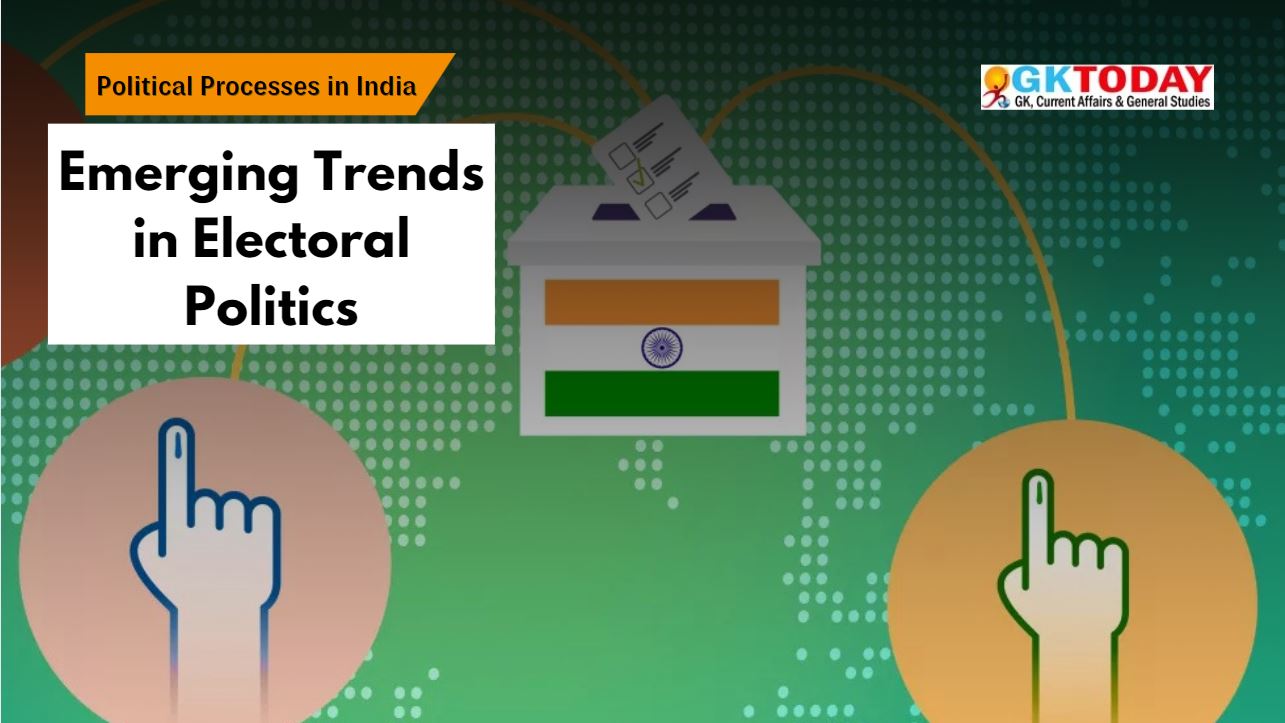Emerging Trends in Electoral Politics in India [UGC NTA NET – Political Science Notes]
Electoral politics in India has undergone transformations in recent years. Some of the most critical changes are discussed below:
Rise of Regional Parties
Regional parties have gained substantial influence in both state and national politics.
- Aam Aadmi Party (AAP): Emerged in Delhi, focusing on anti-corruption and governance.
- Trinamool Congress (TMC): Dominates West Bengal, advocating for local interests and identity.
- Dravida Munnetra Kazhagam (DMK): Strong in Tamil Nadu, emphasising social justice and regional pride.
These parties often prioritise local issues over national ones. They mobilise voters based on regional identities, impacting electoral outcomes.
Coalition Politics
India has shifted from single-party majority governments to coalition dynamics.
- Formation of alliances pre-elections, such as the National Democratic Alliance (NDA) and the United Progressive Alliance (UPA).
- Smaller parties now wield greater bargaining power during negotiations.
Coalition politics necessitates compromise and collaboration, influencing governance and policy-making.
Use of Technology
Technology has transformed electoral processes.
- Electronic Voting Machines (EVMs): Introduced to enhance transparency and efficiency in voting.
- Social Media: Platforms like Facebook and Twitter are utilised for campaigning and engaging voters.
- Data Analytics: Parties use analytics for targeted voter outreach and micro-campaigning.
These tools have reshaped how candidates connect with constituents, making campaigns more strategic.
Voter Demographics
Voter demographics are changing .
- Increased participation of youth and first-time voters, reflecting a shift in political engagement.
- Gender representation initiatives aim to encourage women’s participation in elections.
- Urban and rural voting patterns reveal distinct preferences, influencing party strategies.
About these demographics is vital for parties aiming to secure electoral success.
Political Campaign Strategies
Campaign strategies have evolved to focus more on personalities.
- Personality-Driven Campaigns: Candidates often become the face of their parties.
- Celebrity Endorsements: Influencers and celebrities are increasingly used to attract voters.
- Narrative-Building: Emotional appeals and storytelling are central to modern campaigns.
These strategies aim to create a strong connection between candidates and voters.
Electoral Reforms
Electoral reforms aim to enhance the integrity of the electoral process.
- Introduction of the Model Code of Conduct to curb electoral malpractices.
- Discussions on state funding of elections to reduce reliance on private donations.
- Proposals for transparency in party funding to ensure accountability.
Reforms are essential for maintaining public trust in the electoral system.
Impact of Social Movements
Social movements play role in shaping electoral outcomes.
- Anti-Corruption Movements: Such movements have mobilised public opinion and influenced elections.
- Issue-Based Politics: Topics like environmental concerns and women’s rights are gaining prominence.
These movements highlight the importance of civic engagement in democracy.
Caste and Identity Politics
Caste continues to be factor in Indian electoral politics.
- Caste groups are mobilised for political gains by various parties.
- Identity politics shapes party platforms and voter alignments.
About caste dynamics is crucial for analysing electoral trends.
Political Polarization
Political polarization is on the rise in India.
- Increasing ideological divides among parties complicate governance.
- Majoritarian politics can marginalise minority communities.
- Nationalism plays role in shaping electoral narratives.
Polarisation impacts political discourse and voter behaviour.
Electoral Participation
Voter turnout trends reveal various influencing factors.
- Factors such as education and awareness affect participation rates.
- Initiatives to increase voter education are crucial for enhancing turnout.
- Civil society organisations play a vital role in mobilising voters.
Encouraging greater participation strengthens democracy.
Influence of Money Power
The rising costs of election campaigns pose challenges.
- Corporate funding has impact on political decisions.
- Efforts are being made to regulate campaign financing to ensure fairness.
Addressing money power is essential for a level playing field in elections.
Judicial Interventions
The judiciary plays important role in electoral processes.
- Judicial interventions help resolve electoral disputes and uphold integrity.
- Landmark judgments have shaped electoral practices, such as candidate disqualification.
Judicial oversight is vital for maintaining democracy.
Global Influences
Global political trends impact Indian electoral politics.
- Comparative analysis with other democracies reveals common challenges.
- International organisations influence electoral practices and standards.
Globalisation affects local political dynamics.
Post-Election Dynamics
Post-election scenarios are increasingly complex.
- Trends in alliances and government formation reflect changing political landscapes.
- Opposition parties face challenges in a fragmented political environment.
Navigating governance in coalitions requires strategic cooperation.
Emerging Issues in Electoral Politics
New issues are rising in importance.
- Climate change, digital privacy, and healthcare are becoming central electoral topics.
- Changing voter priorities influence party platforms and policies.
- Grassroots movements are vital in shaping electoral agendas.






